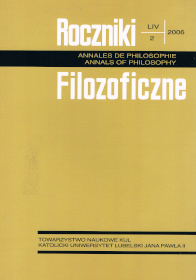Is God a Mathematician?
Abstract
Scientists, when they want to understand properties of complex systems, they divide them into simple parts and – knowing the parts and their relations – reconstruct the whole. This approach is effective in the case of simple systems: atomic nuclei, atoms, chemical compounds, stars and so on. In biology it is supplemented by the theory of evolution. However the situation is hopeless when one wants to explain the astonishing properties of the Universe generally known as Anthropic Principle. Discussing that problem, philosophers use the metaphor of God as a Mathematician. The aim of the paper is to prove the inadequacy of this metaphor.
References
Bondi H. (1965): Kosmologia, PWN, Warszawa.
Davies P. C. W. (1986): Zasada antropiczna, „Postępy Fizyki” 37, s. 213-258.
Schuster H. G. (1993): Chaos deterministyczny. Wprowadzenie, Wyd. Naukowe PWN, Warszawa.
Tempczyk M. (1986): Stałe fizyczne a ewolucja wszechświata, [w:] S. Butryn (red.), Studia z filozofii marksistowskiej, t. II, Wyd. IFiS PAN, Warszawa.
Copyright (c) 2006 Roczniki Filozoficzne

This work is licensed under a Creative Commons Attribution-NonCommercial-NoDerivatives 4.0 International License.





